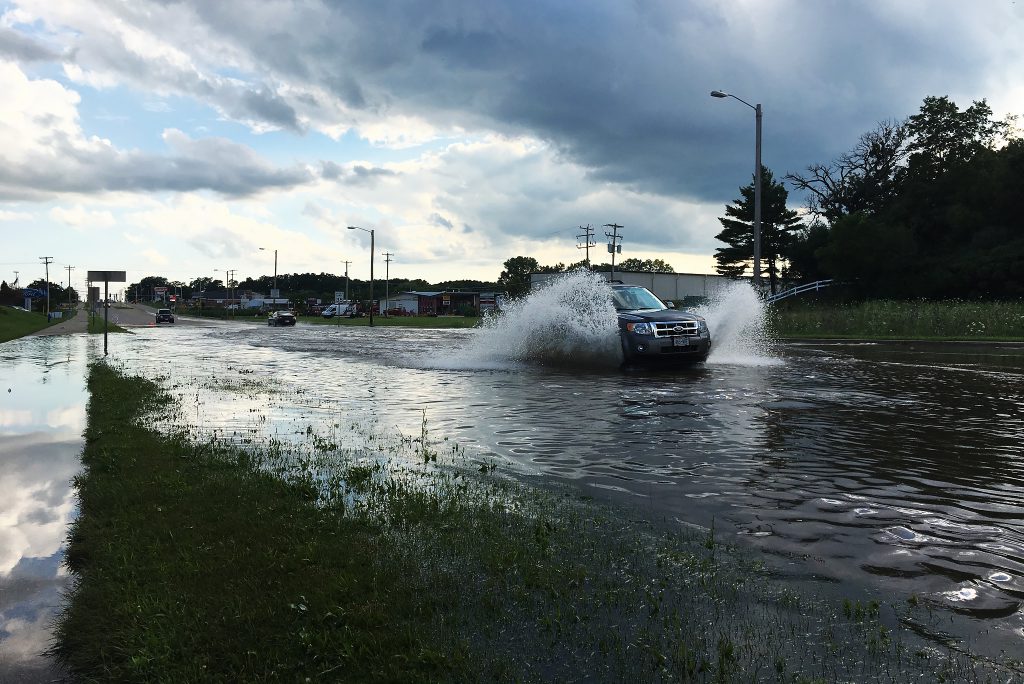State Needs Climate Change Flooding Plan
Governor’s Task Force on Climate Change lays out the changes and challenges state faces.

Flooding in Burlington, WI in 2017. Photo by Capt. Joe Trovato/Wisconsin Department of Military Affairs.
In recent years, flooding has upended the lives of people throughout Wisconsin. Ruined homes, shuttered businesses, washed-out roads and highways, and losses of farm equipment and livestock are the high price the state is paying for extreme precipitation. And severe storms are projected to increase because of climate change. That’s why Governor Tony Evers should take a close look at recommendations from the state’s Task Force on Climate Change—comprising legislators, community leaders, scientists, and other diverse stakeholders—and enact a comprehensive resiliency planning initiative.
According to scientists from the Wisconsin Initiative on Climate Change Impacts, the years 2010 to 2019 were the wettest ever recorded in the state. During that time, Wisconsin experienced 11 major flood-related disasters, each one straining state resources and costing taxpayer dollars for recovery efforts.
In Eau Claire, for instance, a resilience plan could inform city officials about the flood risk posed by the city’s two rivers—and how to build roads, bridges, and other infrastructure to withstand future storms. For fast-growing areas of the state, such as in and around Madison and Milwaukee, the plan would encourage officials to consider how development contributes to stormwater runoff and flooding for people living downstream. Resiliency planning can also identify mitigation solutions to aid communities of color that are often disproportionally affected by flooding and the consequences of climate change. And it would help cities and towns throughout the state to harness natural systems—wetlands, urban parks, and intact floodplains—that can mitigate flood damage and enhance natural resources.
A growing number of states—including Louisiana, Oklahoma, South Carolina, West Virginia, New Jersey, and North Carolina—are recognizing the value of resiliency planning. These states, with varied geographies and political leadership, have launched efforts to develop resilience plans through legislation or by executive order. Governor Evers and Lieutenant Governor Mandela Barnes can, and should, do the same.
By making resilience planning a priority, state officials and experts can get to work now to prepare for the evolving effects of climate change and reduce the damage, heartache, and challenging recovery that follow floods. Doing so will position Wisconsin for a safer and more prosperous future.
Dr. Anna Haines is a professor and extension specialist in the College of Natural Resources at the University of Wisconsin-Stevens Point and with the University of Wisconsin-Extension. She also serves as a member of Governor Evers’ Task Force on Climate Change.
Yaron Miller is an officer with The Pew Charitable Trusts’ flood-prepared communities project.
Op-Ed
-
Unlocking Milwaukee’s Potential Through Smart Zoning Reform
 Jul 5th, 2024 by Ariam Kesete
Jul 5th, 2024 by Ariam Kesete
-
We Energies’ Natural Gas Plans Are A Mistake
 Jun 28th, 2024 by John Imes
Jun 28th, 2024 by John Imes
-
Milwaukee Needs New Kind of School Board
 Jun 26th, 2024 by Jordan Morales
Jun 26th, 2024 by Jordan Morales



















